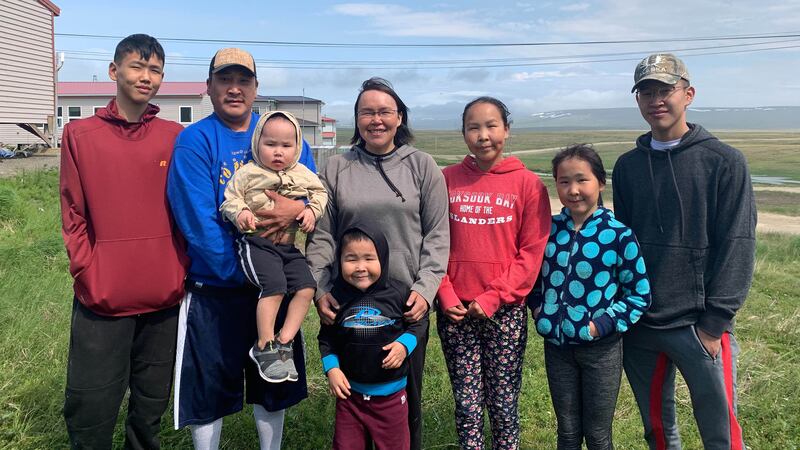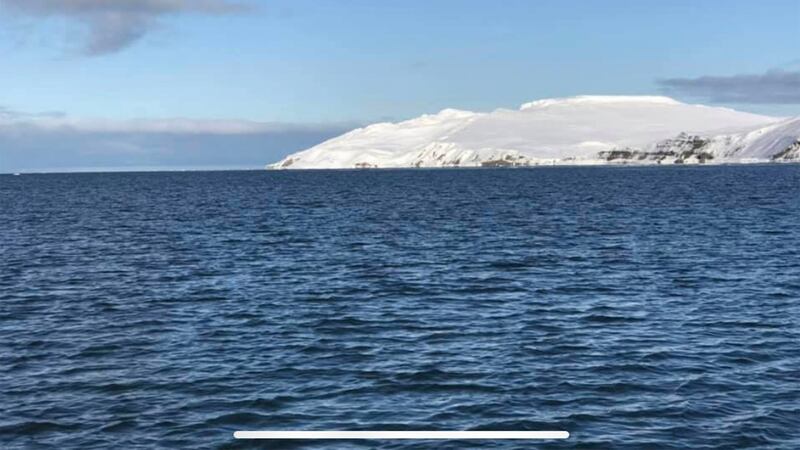A prophecy handed down over the generations by Noah Lincoln’s elders in the Nunakauyarmiut Tribe seemed to be coming true at 4 a.m. Monday.
The inside of his rural Alaska home remained stifling hot even after he jumped up from his bed to open all the windows.
“Our elders used to say someday the winter won’t come anymore, it won’t get cold like it used to,” Lincoln told The Daily Beast later that day. “I used to hear it growing up, all my life.”
ADVERTISEMENT
Noah Lincoln and his wife, Kristy Lincoln, live with their six children in Toksook Bay, population 603. That is the locale chosen for its remoteness to be the official starting place for the latest U.S. Census. The record warm weather there in recent months—ranging up into the 60s this week‚ makes you wonder if the town is also seeing the start of what was foretold by Nunakauyarmiut lore that Lincoln heard as a child.

“I used to hear it growing up,” he said “Over the generations, they used to predict this, and now it’s coming to pass.”
He is modern enough to have what he terms a Native American humor Facebook page with his wife called “Noah loves Kristy.” Yet as he spoke to The Daily Beast from a home that remained uncomfortably hot even with the doors and windows open, he seemed in genuine wonder of his forebears’ gift of prophecy.
“I don’t know how they knew,” he said. “But they knew.”
He was only partly jesting when he said, “Someday we might need air conditioners.”
He noted that air conditioning is not something you hear people talking about in Toksook Bay.
“I’m talking about it because it’s really hot,” he said.
He added, “At least we’re saving up on the stove oil.”
His two younger sons are aged 2 and 4, and he watches them starting life in a native land being transformed.
“You can see them sweating at night,” Lincoln said.
He reported that the only cold snap this year was a single week in January. The rest of the month and all of February were like April. The ice on the bay is usually there until the end of May, but this year it disappeared two months early.
“Four weeks ago fishing, I was hauling in nets and I could work without rubber gloves,” he told The Daily Beast.
His family fishes and hunts to eat, and that is being affected by a corollary prediction the elders made. They used the expression “ungungsiit cimiingetciqluki” to describe a change in the sea and land creatures on which his tribe subsists.
“Animals we hunt to eat won’t come around anymore,” Lincoln said. “There’ll be different sorts of creatures we don’t eat. Animals not native to here, we’ll start seeing them around.”
The first creature to vanish was the Alaska state bird, the Willow Ptarmigan. It once flocked in abundance around Toksook Bay but has become increasingly rare in the past four or five years. It may prefer areas where it retains an advantage in its ability to molt into snow-white feathers and grow snowshoe-like extensions to its feet in winter.
“The Ptarmigan don’t come,” Lincoln reported.
The first non-native creature to appear was a blue shark.
“Like tropical,” Lincoln said. “Long fins.”

What might seem like one benefit from climate change is the increasing number of moose in the area.
“They were rare before,” Lincoln said.
He figures the moose are fleeing the clouds of mosquitoes generated by the increased warmth and perhaps seeking the same natural air conditioning he seeks when throwing open his windows.
“So they could have the Bering Sea breeze,” Lincoln said.
There are also muskox, but hunting them and even creatures as big as a moose is made extremely difficult by the fog that comes with the increased temperature.
“You can’t see,” Lincoln said. “Only a few lucky people get them.”
He noted in a nostalgic tone, “Usually when the weather is cold, blue skies.”
Hunting for muskox is further hampered because the permits run from February to April. The ice at that time is now too thin and the snow too scant for snow machines to be a safe and reliable means to go in search of them.
And thin ice is an even greater hindrance to hunting geese. Lincoln used to be able to roam without a worry between land and sea ice on the way to the places where the geese gather.
“We used to go by snow machine to good spots,” Lincoln said. “You would out go across the bay and it’s not dangerous.”
They now have to go by boat and are restricted to areas within walking distance of the shore. They were reminded in April of the dangers of the usual land travel in a changing climate after three in the Alaskan town of Noatak were killed when two snow machines went through the ice. The air was warm, but the water itself was still around 32 degrees, cold enough to be deadly.
The Lincolns offered their condolences with a heartfelt video on the usually comic “Noah loves Kristy” page.
“Facebook friends from Noatak, we are sending our prayers for comfort over the people who lost their loved ones,” Kristy Lincoln says in the video. “We’re very sorry for your loss.’”
From the Alaska Center for Climate Assessment and Policy at the University of Alaska in Fairbanks, prominent climatologist Rick Thoman told the Daily Beast that Toksook Bay had experienced its warmest spring on record.
“And this summer is starting out very warm,” he said.
Thoman noted that even a small rise in the temperature such as is barely noticed in the lower 48 states can have a huge impact on life in Alaska, which has been generally warming as a whole since mid-2013.
“It’s not just a few degrees more than it used to be,” he said. “It’s all the changes that come with it.”
He offered a brief explanation of a way small changes in Alaska can become big.
“The elephant in that room is the change in snow and ice,” he added.
He said increased melting causes the temperature to rise, which leads to more melting, which leads to higher temperatures, and so on.
“It’s one of those positive feedback loops,” he added.
He did not need to point out the irony of this particular positive feedback loop’s increasingly negative impact. He noted an essential unfairness suffered by groups such as the Nunakauyarmiut Tribe, who have done next to nothing to precipitate climate change.
“The populations and people that have contributed the least, they have the most to lose in a rapidly changing environment,” he said.
Thoman said this on the day that our president, who has all but denied climate change while speeding it up, officially announced that he is seeking another term. His Democratic opponents might think of making a trip to Toksook Bay. The hunting trails would require clothing no warmer than the campaign trial in the lower 40.
As a tribal prophecy becomes an ever more dire reality, Noah Lincoln and his wife will continue keeping their spirits up with their Native American humor page. He will also continue to wonder how the elders knew what they knew.






